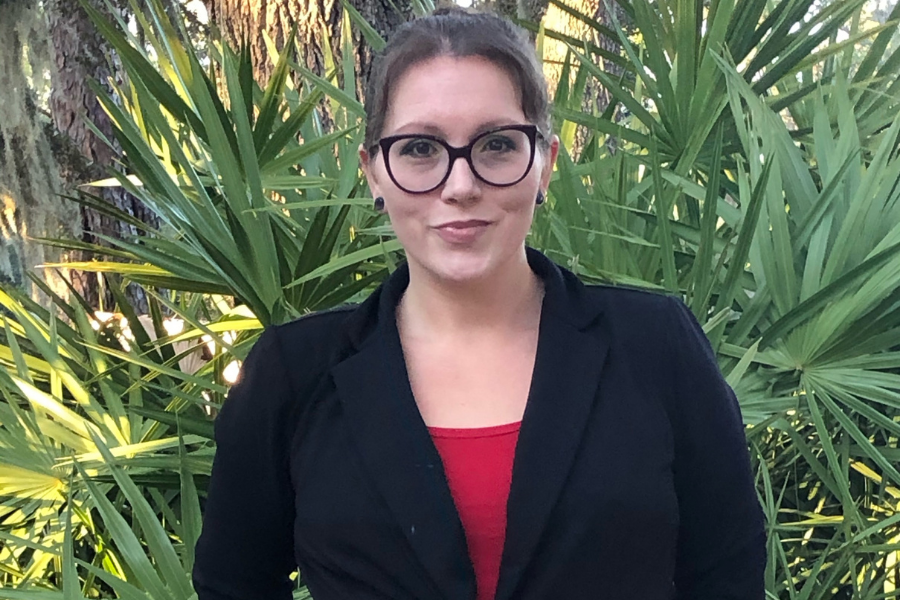Marah Litchford

"Pursuing the truth improves your life"
College: Arts and Sciences
Degree Program: Religion
Degree: Doctorate
Awards: Fulbright-Nehru Research Grant (2021), Edie Moore Graduate Student Travel Award
Why FSU?
I felt that the Department of Religion at FSU offered a level of academic freedom that was not available at other comparable institutions. I knew that I could pursue my research interests surrounded by professors with an objective and informed viewpoint. Given my area of study, the ability to speak honestly and without bias is essential. Further, it was clear to me that the professors I would be working with cared deeply for the success of their students. I knew I would be working with mentors who would hold me to a high standard, be heavily involved, and ensure my work was the best it could be. So far, this has proven true.
Motivation to pursue a graduate degree
My grandparents were always my champions. They encouraged me to find my passion and pursue it as far as I could go. Because of this, I want to earn my PhD to honor their values and influence. However, personally, it is my hope to help the issue of Tibet reach a wider audience. I'd like to see more people understand the interconnections between the Tibetan experience and American interests, and how positive stereotyping might be hindering the best interests of all involved parties. I believe that a graduate degree grants me the forum to have these conversations on a wider scale.
Importance and/or impact of research and work
When Tibet receives attention in America, it is usually in relation to the teachings of His Holiness the Dalai Lama. While many Americans have benefited from his words, far fewer have a nuanced view of the community of people he represents. The popular stereotype of Tibetans as peaceful, long-suffering, and 'non-violent' has created an image that is almost superhuman. This stereotype has greatly limited diplomatic dialogue regarding issues of very real human suffering. My work focuses specifically on the influence of Buddhist ideals on protest strategies. Tibetan protestors speak out against forced labor to create cheap goods for the global supply chain, the global impacts of the degradation of Tibetan lands and rivers, and religious/cultural oppression. Protest methods often do not reflect the Western stereotypes that have been assigned to Tibetans. Given the American involvement in all these issues, it is more important than ever to explore the dynamics of Tibetan ideals regarding politics, protest, and 'non-violence.' There are many brilliant Tibetan scholars and activists whose work will benefit future generations but whose ideas remain unfamiliar to the American populace. It is my hope that my work can help bring attention to their efforts and encourage a more productive and nuanced dialogue regarding the Tibetan liberation movement.
Career aspirations
I deeply enjoy teaching and hope to continue working as a professor for many years to come. However, I also plan to use my academic experience to work with the US Department of State, in the Bureau of Democracy, Human Rights, and Labor.
Advice for anyone considering graduate school
Choose a topic that you love enough to think about nothing else for a very long time. You'll have to hate it, and then love it again, many times over. Make sure that you have a mental health support system, be it family, friends, or professionals. Once in school, even when it seems like there is no time to do so, take time each week to do something that makes you genuinely happy. Make sure it is not related to your work. Go to nature as often as you can.
Accomplishments during graduate career
During my time in graduate school, I have been a single parent to a brilliant and kind daughter. Being her mom is the thing I am most proud of in this life.
International Education Experience
My international study truly changed my life in every way imaginable. My perspective on the world shifts with each new location. The personal benefits of building relationships with those who have a different life experience than your own cannot be overstated. This is the true value of the humanities - meaningful connections that lend clarity to complex real-world issues. I chose that as the topic of my TEDx talk because I think, too often, there is an assumption that degrees like mine can’t lead to a real job or a good paycheck. My studies abroad showed that was not true. The professional benefit of my international work was huge. Each study abroad helped build my opportunities for further travel and scholarships. In Nepal, I made friends who introduced me to professional contacts and made a trip to Canada possible. In Paris, I met brilliant scholars at a conference who then helped me connect with other scholars in India. And all of it gave me the chance to get a more nuanced understanding of the global networks of Tibetan NGOs, which I had previously only worked with in the US. Workers in these NGOs are some of the most intelligent and tenacious people I’ve ever known, and I was honored to witness their courage. More recently, my work with Fulbright encouraged me to become an intern with the State Department, in the Office of International Religious Freedom. I believe this lays the groundwork for a meaningful career. Whatever the future holds, I hope I can repay the patience and kindness of those who gave so generously of their knowledge during my travels.
